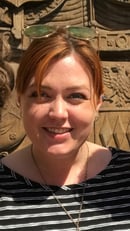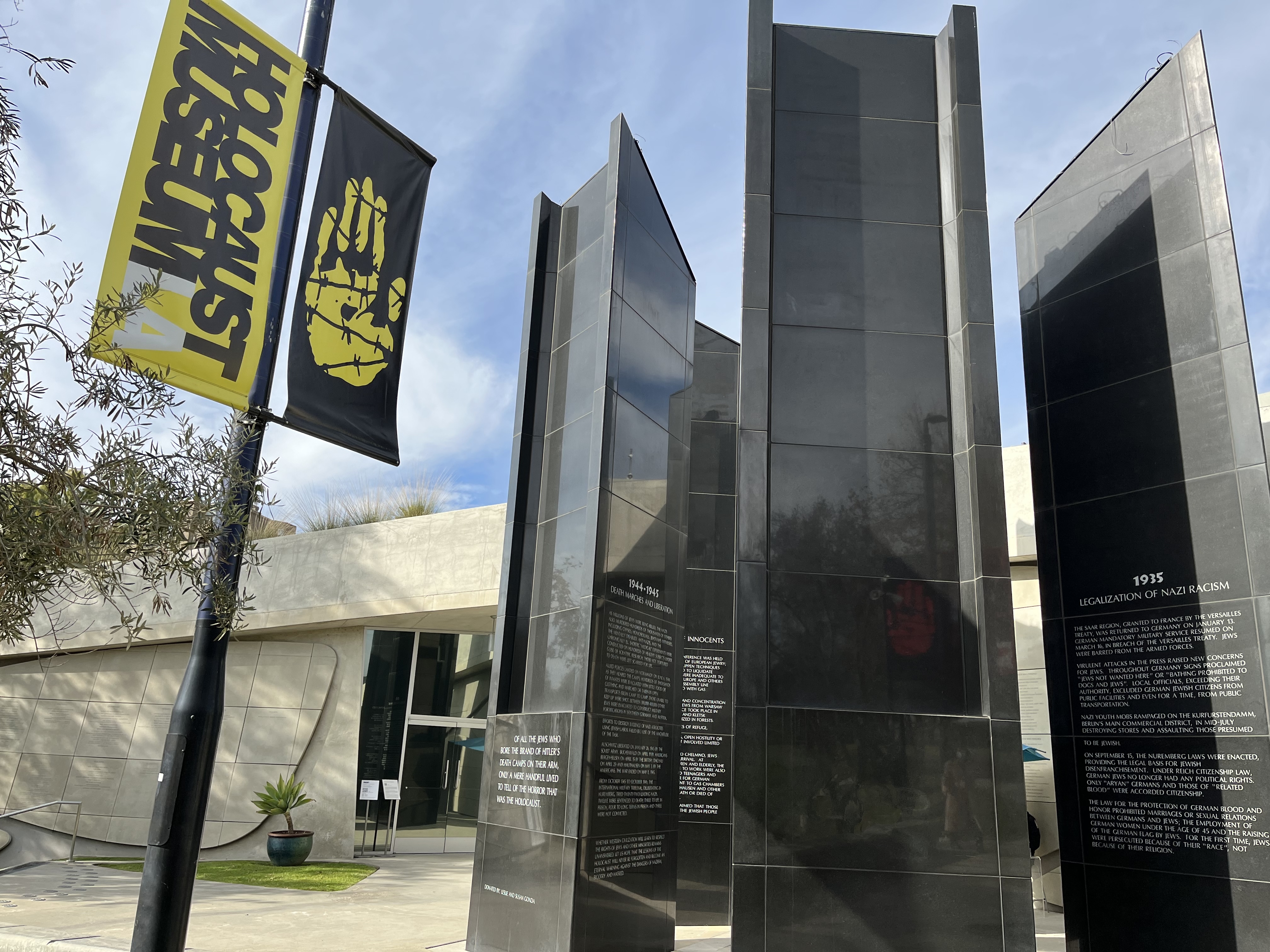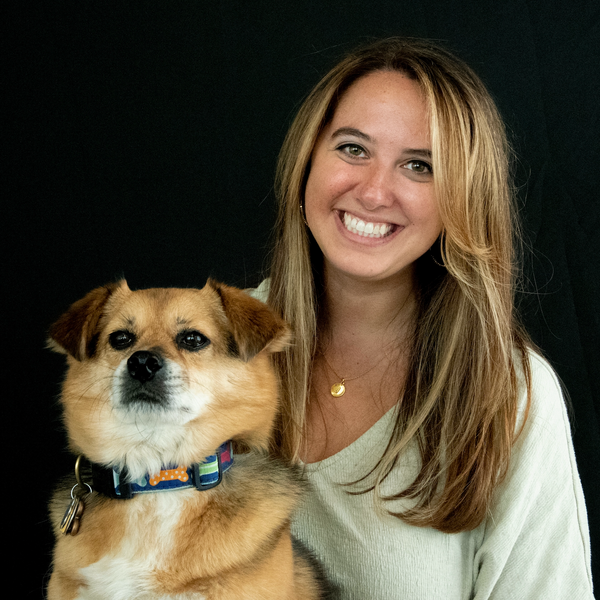International Holocaust Remembrance Day — A Q&A With Holocaust Museum LA’s Education Programs Manager
Jan 27, 2023 Jen Weber
January 27 marks a very important, yet heartbreaking day of tribute — International Holocaust Remembrance Day. While it serves as an annual reminder of “Never Again,” it’s especially important to dig into that message a little more this year on the heels of rising antisemitism.
I sat down with someone near and dear to me, my friend and former college roommate Rachel Podber-Kennison, the education programs manager at Holocaust Museum LA, which is the oldest and first survivor-founded Holocaust museum in the U.S. that serves to “inspire humanity through truth.”
In the below Q&A, Rachel sheds light on this historic day and provides advice for organizations, and individuals, on how we can make change happen.
JEN: What does this day mean? Why is it important?
RACHEL: International Holocaust Remembrance Day (IHRD) is a day of remembrance and mourning for the Holocaust, the state-sponsored persecution and annihilation of European Jews at the hands of Nazi Germany. Millions of other minorities were also targeted, including Roma-Sinti, Jehovah's Witnesses, and members of the queer community. The date carries significance to it, as it is the anniversary of the liberation of Auschwitz, the largest of the six main death camps built by Nazi Germany. There is also a Jewish Holocaust Remembrance Day (Yom HaShoah) held in April on the anniversary of the Warsaw Ghetto Uprising. There is a strong emphasis on education during IHRD, focusing on the lessons of the Holocaust and how we can prevent other atrocities like it.
We will never know the names of every single one of the six million Jews and millions of other victims of the Holocaust, as entire towns, cities, and communities were wiped out. By observing IHRD, we can take time out of our year to remember all those who perished during the Holocaust, and focus on the ways in which we can prevent hate from becoming too powerful in any place. The exact date of death for many victims is also not known, so this date of remembrance gives survivors a specific day when they can take time to remember their loved ones, families, and friends who perished. For me personally, Holocaust Remembrance Day is a day where I take time to think of my grandparents, both survivors from Poland, and remember the lives of my grandfather's family whose murders he witnessed and carried with him for the rest of his life.
JEN: Why does this day matter now, more than ever, given the events and headlines of the last year?
RACHEL: Antisemitism has rapidly risen, especially in the last few years. According to a study by the ADL (Anti-Defamation League), 85% of Americans believe in at least one anti-Jewish stereotype — this is 282 million people — while there are only eight million Jewish people in total in the U.S. Between 2019 and 2022, the number of Americans who believe in at least six anti-Jewish stereotypes has doubled (both statistics from ADL's "Antisemitic Attitudes in America: Topline Findings").
There is also an alarming lack of knowledge about the Holocaust among younger generations today. In 2020, the Claims Conference released a study called the "U.S. Millennial Holocaust Knowledge and Awareness Survey," and the numbers were shocking. Sixty-three percent of respondents did not know that six million Jewish people were murdered in the Holocaust, and 48% of nationwide respondents could not name a single ghetto or concentration camp, even though the Nazis built over 40,000 ghettos and camps across Europe. Almost 20% of Millennials and Gen Z surveyed in New York believed that the Jews caused the Holocaust, and 56% of Millennials and Gen Z nationwide could not identify what Auschwitz was.
Antisemitism has been normalized in our society, and we are seeing a rapid increase in incidents, especially on school campuses. We are hearing from more and more students in our own community about antisemitism that they are witnessing or experiencing. With each passing year, we are sadly getting closer to the day when there will not be Holocaust survivors still with us to share their stories and experiences firsthand and ensure that their stories are passed down to future generations. It is our duty to remember and learn about the Holocaust, and ensure that the truth continues to be told.
JEN: How and why does rhetoric play such an important part in overall Jewish education?
RACHEL: Words have an incredible impact, and it is crucial to understand that. The targeted rhetoric that is being used today reflects thousands of years of antisemitic ideas, stereotypes and hatred. Antisemitic rhetoric being spewed today is not new and has been used throughout history to target, discriminate against and harm Jewish people. The Holocaust didn't begin with death marches and Zyklon B; it began with the spread of hateful ideas and anti-Jewish rhetoric, scapegoating and beliefs.
JEN: Do you believe the media has played a part?
RACHEL: Media played a crucial role in the rise of Nazi Germany. The Nazi government seized control of the German radio and newspapers and gave each German household a free radio so they could have their own voices and messages constantly streaming into the homes of every non-Jewish family. They made it illegal to listen to any radio station that wasn't run by the Nazi government, but there were resistance groups like The White Rose who listened to the BBC in secret.
In the museum’s second gallery, which covers the rise of Nazi Germany and early persecution, we have a copy of the Nazi newspaper, Der Stürmer. On the bottom in bold letters is the phrase "Die Juden sind unser unglück,” which means "the Jews are our misfortune." This was on the front page of every single issue of the newspaper. Later, in the gallery covering the aftermath of WWII, there is a photo of Julius Streicher on trial at Nuremberg — he never held a gun or fired a bullet, and he wasn't in charge of any concentration camps. He was the owner and editor of Der Stürmer, and he was put on trial and found guilty of inciting genocide because of the hateful rhetoric he spread in his newspaper and through his publishing company.
JEN: What advice do you have about how organizations, and individuals, can best make change happen?
RACHEL: It's important to speak up against discrimination or hateful rhetoric of any kind and any form. It's also important to listen to the voices of minority groups — in the case of antisemitism, it is crucial to create a space where Jewish people can speak up without fear of harm or retaliation. Education is key. By learning more about the history of antisemitic tropes and the ways in which they have morphed over time, we can all work together to identify antisemitic language and dog whistles when they start and speak out before they gain more power. You can also support organizations and people who are fighting against antisemitism and bigotry worldwide.
You can learn more about Holocaust Museum LA’s educational programs here. We invite you to light a candle and put it safely in your window to remember those who were murdered for who they were and stand against prejudice and hatred today.
 About Rachel Podber-Kennison
About Rachel Podber-Kennison
Rachel is the Education Programs Manager at Holocaust Museum LA. She grew up in Atlanta, GA, received her Bachelor’s degree in Film & TV from Boston University and earned her Master’s degree in Museum Studies from the University of Leicester. Rachel is also the granddaughter of two Holocaust survivors from Poland, so she deeply understands the importance of Holocaust Education and the urgent need to hear the stories of survivors while we still can. She has been with Holocaust Museum LA for over three years, starting as a volunteer educator and joining the staff full time in April 2021.






